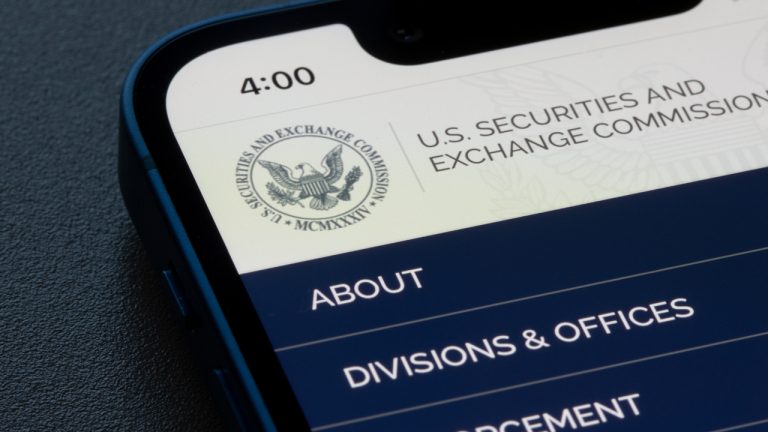 Binance Kazakhstan has secured a full Digital Asset Trading Facility (DATF) license from the Astana Financial Services Authority. This approval allows the crypto exchange to operate as a trading platform, broker-dealer, and digital asset custodian. Kazakhstan becomes the first Central Asian country where Binance has regulatory approval, positioning it as a key fintech hub. Binance […]
Binance Kazakhstan has secured a full Digital Asset Trading Facility (DATF) license from the Astana Financial Services Authority. This approval allows the crypto exchange to operate as a trading platform, broker-dealer, and digital asset custodian. Kazakhstan becomes the first Central Asian country where Binance has regulatory approval, positioning it as a key fintech hub. Binance […]

Prometheum’s willingness to play along with the SEC’s ambitions for crypto regulation has stirred disapproval in many quarters.
Members of the United States Congress want to know what the Securities and Exchange Commission and Financial Industry Regulatory Authority (FINRA) were talking about when the SEC established Special Purpose Broker-Dealer (SPBD) requirements. They suspect the organizations and crypto trading and custody services provider Prometheum are setting an unwelcome precedent.
Chairman of the House Financial Services Committee Patrick McHenry and subcommittee heads Bill Huizenga and French Hill, all Republicans, stated in a letter to SEC Chair Gary Gensler that they were dissatisfied with the SEC’s response to a March 26 inquiry by 48 members of the House Financial Services and Agriculture Committees concerning Ether’s (ETH) classification as a security, rather than a commodity, and Prometheum’s intent (since realized) as an SPBD to custody ETH.
Related: US lawmakers allege CCP connection in calling for SEC, DOJ investigation of Prometheum
 A new class action lawsuit was initiated against the San Francisco-based cryptocurrency exchange Coinbase on May 3. The legal action claims that Coinbase deliberately sold securities that are unregistered with regulatory authorities. Additionally, the lawsuit charges Coinbase with operating as an unregistered securities broker. Lawsuit Alleges Coinbase Illegally Sold Securities Without Registration According to legal […]
A new class action lawsuit was initiated against the San Francisco-based cryptocurrency exchange Coinbase on May 3. The legal action claims that Coinbase deliberately sold securities that are unregistered with regulatory authorities. Additionally, the lawsuit charges Coinbase with operating as an unregistered securities broker. Lawsuit Alleges Coinbase Illegally Sold Securities Without Registration According to legal […] According to a recent report, the cryptocurrency exchange Bittrex received a Wells notice from the U.S. Securities and Exchange Commission (SEC) in March, signaling a potential lawsuit. The SEC’s enforcement division sent the Wells notice prior to Bittrex deciding to wind down its operations in the United States. ‘Lack of Regulatory Clarity’ in the U.S. […]
According to a recent report, the cryptocurrency exchange Bittrex received a Wells notice from the U.S. Securities and Exchange Commission (SEC) in March, signaling a potential lawsuit. The SEC’s enforcement division sent the Wells notice prior to Bittrex deciding to wind down its operations in the United States. ‘Lack of Regulatory Clarity’ in the U.S. […] On March 9, 2023, New York attorney general Letitia James announced that her office had once again cracked down on crypto platforms by filing a lawsuit against the Seychelles-based crypto exchange Kucoin. Members of the Office of the Attorney General (OAG) were able to purchase crypto assets, despite the exchange not being registered in the […]
On March 9, 2023, New York attorney general Letitia James announced that her office had once again cracked down on crypto platforms by filing a lawsuit against the Seychelles-based crypto exchange Kucoin. Members of the Office of the Attorney General (OAG) were able to purchase crypto assets, despite the exchange not being registered in the […] Crypto lender Celsius’ committee of unsecured creditors has chosen the digital asset investment firm Novawulf Digital Management to sponsor the company’s reorganization plan, according to a statement published on Wednesday. The proposed agreement would enable Celsius to exit the Chapter 11 bankruptcy process, and the new owners could begin distributing funds as early as June, […]
Crypto lender Celsius’ committee of unsecured creditors has chosen the digital asset investment firm Novawulf Digital Management to sponsor the company’s reorganization plan, according to a statement published on Wednesday. The proposed agreement would enable Celsius to exit the Chapter 11 bankruptcy process, and the new owners could begin distributing funds as early as June, […]
The new proposals set forth by the Gensler-led SEC seek to “expand the scope” of rules set out by the 2009 Custody Rules.
A five-member panel of the United States Securities Exchange Commission (SEC) has voted 4-1 in favor of a proposal that may make it more difficult for cryptocurrency firms to serve as digital asset custodians in the future.
The proposal, which is yet to be officially approved by the SEC, recommends amendments to the “2009 Custody Rule” will apply to custodians of “all assets” including cryptocurrencies, according to a Feb. 15 statement from SEC Chairman Gary Gensler.
Gensler stated that currently, some crypto trading platforms that are offering custody services are not actual “qualified custodians.”
According to the SEC, a qualified custodian is generally a federal or state-chartered bank or savings association, trust company, a registered broker-dealer, a registered futures commission merchant, or a foreign financial institution.
In order to become a “qualified custodian” under the newly proposed rules, U.S. and offshore firms would additionally need to ensure that all custodied assets — including cryptocurrencies — are properly segregated, while these custodians will be required to jump through additional hoops such as annual audits from public accountants, among other transparency measures.
We @SECGov just proposed to expand & enhance the role of qualified custodians when registered investment advisers custody assets on behalf of investors.
— Gary Gensler (@GaryGensler) February 15, 2023
Thru our rule, investors would get the time-tested protections—and qualified custodians—they deserve.
What does this mean? ⬇️ pic.twitter.com/RerUGnpArI
While Gensler said these amendments would “expand the scope” to all asset classes, he specifically took a shot at the crypto industry:
“Make no mistake: Today’s rule, the 2009 rule, covers a significant amount of crypto assets. [...] Further, though some crypto trading and lending platforms may claim to custody investors’ crypto, that does not mean they are qualified custodians. Rather than properly segregating investors’ crypto, these platforms have commingled those assets with their own crypto or other investors’ crypto.”
“When these platforms go bankrupt—something we’ve seen time and again recently—investors’ assets often have become property of the failed company, leaving investors in line at the bankruptcy court,” the SEC Chairman added.
Gensler also pointed to the industry's track record to suggest that few crypto firms would be reliable enough to serve as qualified custodians:
“Make no mistake: Based upon how crypto platforms generally operate, investment advisers cannot rely on them as qualified custodians.”
However, not every SEC member is on board with Gensler’s plans.

While the proposal isn’t “regulation by enforcement” per se, Commissioner Hester Peirce said “the latest SEC statement seems designed for immediate effect” to take down the crypto industry:
“Such sweeping statements in a rule proposal seem designed for immediate effect, a function proposing releases should not play. These statements encourage investment advisers to back away immediately from advising their clients with respect to crypto.”
As for the proposal itself, Peirce believes it would do more harm than good.
She explained that such stringent measures will force investors to remove their assets from entities that have developed sufficient safeguarding procedures to mitigate and prevent fraud and theft:
“The proposal would expand the reach of the custody requirements to crypto assets while likely shrinking the ranks of qualified crypto custodians. By insisting on an asset neutral approach to custody we could leave investors in crypto assets more vulnerable to theft or fraud, not less.”
As for the next steps, Peirce noted the agency will soon schedule in a 60-day comment period once the proposal has been published in the Federal Register.
Related: US lawmakers and experts debate SEC’s role in crypto regulation
However, the commissioner is concerned that this timeframe isn’t sufficient to allow the public to analyze all aspects of the proposal.
Those who voted in favor of the proposal are hoping to implement the new rules within 12-18 months, according to Peirce, adding that it was an "aggressive timeline" given the changes being proposed

After a recent warning from the SEC, registered crypto brokers and advisers may need to be on edge when giving advice this year.
Crypto brokers and investment advisers offering or giving advice about cryptocurrencies will be put under the scope of the United States securities watchdog this year.
A Feb. 7 statement from the Securities and Exchange Commission’s (SEC) Division of Examinations outlined its priorities for 2023, suggesting brokers and advisers dealing in crypto will need to be extra careful when offering, selling or making recommendations regarding digital assets.
It stated that SEC-registered brokers and advisers will be closely watched to see if they followed their “respective standards of care” when making recommendations, referrals and providing investment advice.
Today we announced the Division of Examinations 2023 priorities. The Division publishes its examination priorities annually to provide insights into its risk-based approach.
— U.S. Securities and Exchange Commission (@SECGov) February 7, 2023
For more:
The SEC will also examine whether these entities “routinely” review and update their procedures to ensure they meet “compliance, disclosure and risk management practices.”
This announcement was similar to the SEC’s priorities released in 2022, however, it seems this year the regulator is putting more emphasis on standards of care and practices by brokers rather than their consideration of unique risks presented by “emerging financial technologies” highlighted in 2022.
The most recent statement comes nearly two weeks after a report claimed the SEC has been investigating registered investment advisers that may be offering digital asset custody to its clients without proper qualifications.
Related: SEC leaked crypto miners’ personal information during investigation: Report
The SEC’s investigation has reportedly been going on for several months but is now top of the priority list after the collapse of the crypto exchange FTX, according to a report from Reuters.
By law, investment advisory firms must be qualified to offer custody services to clients and comply with custodial safeguards set out in the Investment Advisers Act of 1940.

The judge ruled domestic law doesn’t apply to Binance as it is not an exchange domestic to the U.S. and that the case was filed “too late”.
A federal judge has dismissed a class action complaint asserting Binance violated U.S. securities laws by not registering as a broker-dealer or exchange, and sold crypto tokens which were not registered with the U.S. Securities and Exchange Commission (SEC).
The original complaint filed in the U.S. District Court for the Southern District of New York was brought by a group of investors who say they invested in the tokens EOS, BNT, SNT, QSP, KNC, TRX, FUN, ICX, OMG, LEND, ELF, and CVC around 2017 and 2018. An amended complaint was filed, only listing nine tokens, with BNT, SMT, and CVC removed.
The investors said the tokens had lost much of their value since purchasing, and were seeking compensation for the price paid for the tokens and the fees paid to Binance in connection with their purchases.
“Binance and the Issuers wrongfully engaged in millions of transactions, including the solicitation, offer, and sale of securities, without registering the Tokens as securities, and without Binance registering with the SEC as an exchange or broker-dealer. As a result, investors were not informed of the significant risks inherent in these investments, as federal and state securities laws require.”
The investors further claimed that Binance capitalized on the enthusiasm brought on by cryptocurrencies, marketing tokens and initial coin offerings (ICOs) on behalf of projects, and profited off the associated trading fees, and added they “purchased the tokens with a reasonable expectation of profit from owning them”.
In his decision on Thursday, March 31st, Judge Andrew L. Carter said that as the investors waited more than a year after purchasing the tokens to file the complaint, they had sued too late. Most of the tokens were purchased in 2018 and the original filing wasn’t until April 2020.
The investors argued that as the SEC published a framework asserting digital tokens were securities in April 2020, that the timeline for complaint submission should have started then, but Carter found that the relevant laws apply when the supposed violation occurs, not when it is detected.
Judge Carter also said that domestic securities laws are not applicable to Binance, as it is not a domestic exchange in the U.S., being headquartered in the Cayman Islands. Binance does use Amazon Web Services to host its infrastructure andthat is based in the U.S., but that isn’t enough to consider Binance as a domestic exchange.
Related: Voyager ordered by New Jersey to 'cease and desist’
"Plaintiffs must allege more than stating that plaintiffs bought tokens while located in the U.S. and that title passed in whole or in part over servers located in California that host Binance's website," Carter wrote in the motion.
This isn’t the only class action lawsuit filed against a crypto exchange on such grounds. On March 11, a suit was filed against Coinbase in the same court, alleging it's operating as an unregistered securities exchange. Similar arguments are being directed at Coinbase, with plaintiffs saying they were not warned of the risks of cryptocurrency investments.
Binance did not immediately respond to Cointelegraph’s request for comment.